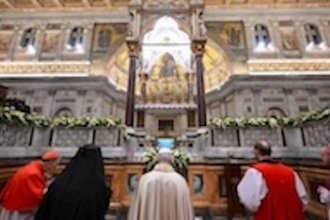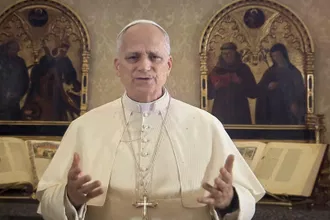Pope Leo's first day in Turkiye

Pope Leo with Türkiye's President of Religious Affairs, Safi Arpaguş Image: Vatican Media
Source: Vatican News
Pope Leo XIV landed on Thursday in the Turkish capital of Ankara, the first stop on a six-day visit to Türkiye and Lebanon - the first Apostolic Journey of his pontificate.
He was met at the airport by Türkiye's Minister of Culture and Tourism, Mehmet Nuri Ersoy. After the official welcoming ceremony, the Holy Father visited the Mausoleum of Mustafa Kemal Ataturk, where he laid a wreath at the tomb of the founder and first president of the Republic of Türkiye.
Signing the "Golden Book" to commemorate his visit, the Pope wrote, in English, "I give thanks to God for being able to visit Türkiye, and I invoke upon this country and its people an abundance of peace and prosperity."
The first day in Türkiye was largely taken up with meetings with political and civil authorities.
Following the visit to the Ataturk Memorial, Pope Leo was escorted by horse guards to the Presidential Palace, where he was received by President Recep Tayyip Erdoğan.
After a private meeting in the office of the President, the two leaders made their way to the Nation's Library for an encounter with authorities, representatives of civil society, and members of the diplomatic corps.
Pope Leo's address highlighted Türkiye's role in as "bridge" uniting different communities, the importance of families in the modern world, and the necessity of rejecting the "globalization of indifference" in favour of a "culture of encounter."
He spoke of Türkiye as a land "inextricably linked to the origins of Christianity," yet also one that calls together all children of Abraham - Muslims, Christians, and Jews - to recognize difference not as division, but as a pathway to fraternity.
The Pope reflected on the natural beauty and rich cultural diversity of the country, describing them as reminders that human civilization flourishes where generations, ideas, and traditions meet.
Such diversity, he stressed, is not a threat but a safeguard of social vitality. "Uniformity would be an impoverishment," he said, insisting that bridges-real and symbolic-are what sustain a truly civil society.
The emblem chosen for the Pope's journey depicts the bridge over the Dardanelles Strait. It is, the Pope said, a symbol of Türkiye's unique identity: a nation physically connecting Asia to Europe, but even more profoundly, connecting itself - from east to west, from tradition to modernity, from difference to unity.
In a world strained by polarization and extreme positions, he warned, societies risk fragmentation.
Yet Christians in Türkiye, he affirmed, stand ready to contribute positively to the country's unity, recalling the affection of Saint John XXIII, who once served here and urged Catholics to reject isolation and embrace a "culture of encounter." Those words, the Holy Father noted, remain strikingly relevant today.
"God built a bridge between heaven and earth"
Pope Leo turned to the Gospel image of God as bridge-builder - God who, in revealing Himself, created a passage between heaven and earth so that hearts might learn to mirror His compassion.
Justice and mercy, he insisted, must challenge the logic of domination. Compassion and solidarity - not power - must be the true measures of development.
He warned of the dangers of technological progress detached from ethics, reminding his listeners that even artificial intelligence ultimately magnifies human choices. "Processes are not the work of machines, but of humanity itself," he said, urging leaders to work together "to repair the damage done to the unity of our human family."
Turning to a theme close to the hearts of many Turks, Pope Leo spoke of the family as "the first nucleus of social life," the space where each person learns the essential truth that "without the other, there is no I."
He celebrated the country's efforts to strengthen the role of the family, while also acknowledging the risks any family faces if it isolates itself or suppresses the voices of its own members.
Happiness, he said, does not come from individualism nor from scorning the bonds of marriage and openness to life.
He warned of consumerist cultures that turn loneliness into a commodity, urging instead "a culture that appreciates affection and personal connection" - a culture in which both conjugal love and the indispensable contribution of women are honoured.
Women, he affirmed, increasingly enrich the country through scholarship, professional life, public service, and cultural leadership.
A call for Türkiye to be a source of peace
The Holy Father expressed his hope that Türkiye may continue to serve as "a source of stability and rapprochement between peoples," recalling the visits of Popes Paul VI, John Paul II, Benedict XVI, and Francis.
His own visit, tied to the anniversary of Nicaea, where early Christians met to seek unity of faith, speaks of the eternal need for dialogue and encounter.
At a time when the world is once again marked by heightened conflict, he warned against what Pope Francis called "a third world war fought piecemeal."
Nations, he said, are investing their energies in destructive dynamics rather than in the shared challenges of peace, combating hunger, protecting creation, and securing education and health for all.
Walking together in truth and friendship
The Holy See, Pope Leo said, comes with "only its spiritual and moral strength," yet with a firm desire to work alongside all nations committed to the integral development of every person.
"Let us walk together," he concluded, "in truth and friendship, humbly trusting in the help of God."
The Pope's final official visit was to the Presidency of Religious Affairs, the Diyanet - the government institution that promotes the teaching and practice of Sunni Islam in Türkiye - for a private meeting with the Diyanet's President, Safi Arpaguş.
Although the Republic of Türkiye, since its foundation, is a secular state, the vast majority of the population, over 99%, is Muslim.
Pope Leo concluded his first day in Türkiye with a brief stop at the Apostolic Nunciature for a meeting with the personnel before returning to the airport for the short flight to Istanbul.
The Holy Father's Apostolic Journey continues on Friday with prayers with the bishops, priests, deacons, men and women religious, and pastoral workers in Istanbul's Cathedral of the Holy Spirit, followed by a pastoral visit to a special care facility for the elderly run by the Little Sisters of the Poor.
Friday afternoon will see one of the highlights of the Pope's visit, the Ecumenical Prayer Service in Nicaea - modern-day Iznik - to mark the 1,700th anniversary of the First Ecumenical Council in the history of the Church.


















